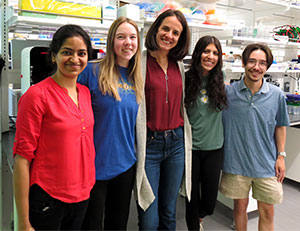
Contact Us
Institutional Communications
Bureau of Mines Building, Room 137
Laramie, WY 82071
Phone: (307) 766-2929
Email: cbaldwin@uwyo.edu
UW Associate Professor Receives American Heart Association Research Award
Published June 20, 2024

From left, Sharanya Satyanarayana Bettadapura, a UW graduate student from Bangalore,
India; Emma Mehl, a graduate student from El Dorado Hills, Calif.; Danielle “Nellie”
Bruns, an associate professor with the Division of Kinesiology and Health; Vaishnavi
Bhavsar, an undergraduate student from Lander; and Julian Matthews, vivarium coordinator
and incoming graduate student from Raleigh, N.C., are studying whether a molecular
clock in the heart, rather than the brain, regulates circadian rhythm in other body
tissues. (UW Photo)
Danielle “Nellie” Bruns, an associate professor with the University of Wyoming’s Division of Kinesiology and Health, has received an American Heart Association (AHA) Transformational Project Award.
The funding is used to advance research on understanding mechanisms of heart disease -- including the impact of age and sex on the failing heart, exercise as medicine for heart failure and the identification of new therapies for the treatment of heart disease.
Bruns’ award, totaling $300,000, begins July 1 and runs through June 2027.
Both Bruns and co-contributor William “Trey” Todd, an assistant professor in UW’s Department of Zoology and Physiology, are working to understand a new paradigm in which a heart-centric molecular clock regulates circadian rhythm in other body tissues. The current timekeeping paradigm suggests that the master clock in the brain coordinates and maintains rhythm; however, Bruns and Todd’s data show that a clock in the heart regulates circadian function.
Their project is titled “Mechanisms of circadian control by the cardiac molecular clock.”
“We’re really thrilled for this opportunity to continue investigating new roles for the heart in circadian biology,” Bruns says. “This exciting collaboration between my group and Dr. Todd started with support from the Wyoming Sensory Biology Center, and we look forward to taking this research forward with support from the AHA.”
Part of Bruns’ group includes three graduate students and one undergraduate working on the funded proposal: Sharanya Satyanarayana Bettadapura, a graduate student from Bangalore, India; Emma Mehl, a graduate student from El Dorado Hills, Calif.; Julian Matthews, vivarium coordinator and incoming graduate student from Raleigh, N.C.; and Vaishnavi Bhavsar, an undergraduate student from Lander. Bhavsar is a summer Fellow in the Wyoming INBRE (IDeA Networks of Biomedical Research Excellence) program.
The Bruns lab is in UW’s Science Initiative Building.
Qian-Quan Sun, director and principal investigator with the Wyoming Sensory Biology Center, points out the importance of Bruns’ research.
“So far, most of what we know about circadian regulation of our body’s physiological states are based on the central circadian system in the brain,” Sun says. “Dr. Bruns’ research examining the unique roles of cardiokines, derived from the heart, in regulation of the circadian rhythms is conceptually innovative and important work.”
“This award from the American Heart Association shows the continued advancement of Dr. Bruns’ research,” says Michelle Hilaire, interim dean of the College of Health Sciences. “Heart disease has significant health and economic implications globally and to a rural state like Wyoming. I’m ecstatic that the AHA recognized the implication of Nellie’s research with this project award.”
To learn more about Bruns’ research, visit www.uwyo.edu/kandh/labs/cardic-aging-lab.html.
About the University of Wyoming College of Health Sciences
UW’s College of Health Sciences trains health and wellness professionals and researchers in a wide variety of disciplines, including medicine, nursing, pharmacy, speech-language pathology, social work, kinesiology, public health, health administration and disability studies. The college also oversees residency and fellowship programs in Casper and Cheyenne, as well as operating a speech/hearing clinic in Laramie and primary care clinics in Laramie, Casper and Cheyenne.
With more than 1,600 undergraduate, graduate and professional students, the college is dedicated to training the health and wellness workforce of Wyoming and conducting high-quality research and community engagement, with a particular focus on rural and frontier populations.
Contact Us
Institutional Communications
Bureau of Mines Building, Room 137
Laramie, WY 82071
Phone: (307) 766-2929
Email: cbaldwin@uwyo.edu
